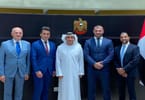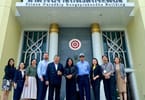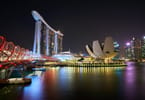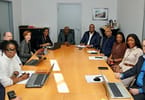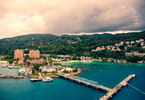The eagerly awaited 2010 FIFA World Soccer Cup (WSC) is just two months away. It seems like the other day, when in 2002 or thereabouts, South Africa, with the backing of the legendry former President Nelson Mandela, missed out on the 2006 WSC, which went to Germany and left Africa crest fallen. Nevertheless, Africa was eventually consoled by the Federation of the International Football Association (FIFA) and is now hosting the 2010 WSC in South Africa, and the continent is ecstatic over this important sports event.
Reports coming from South Africa indicate that the country will make it against all odds, including wide-spread skepticism and will not discount the usual stereotyped prejudices against Africa by detractors. The stadiums are almost 100 percent ready, in spite of deep-rooted fears about South Africa’s capability to deliver. The ancillary infrastructure in terms of hotels and surface transport around the country is, by and large, in place, and despite unwarranted jitters and second guessing about tranquility and security during the tournament, South Africa seems to be on top of the situation to deliver on these critical aspects as well.
The WSC is more than just a sports competition. It is about people, politics, and economics. While it is true that South Africa will be the epicenter of WSC activities, it is also very real that Africa and, in particular, South African neighbors, will feel the “tremors” emanating from the WSC show, and the converse could be true. Take, for example, the unfortunate and poignant attack on the Togolese Soccer Team in Cabinda, Angola, by the separatist rebels. This act was enough to send shockwaves far and wide and has indeed raised eyebrows and invoked security alert levels in South Africa. On a positive note, the WSC is expected to usher in an economic bonanza not only to the host country but also to the neighboring countries – Tanzania included. However, to benefit from this windfall, South African’s neighbors need to get their acts together in order to meet the WSC’s needs and wants.
According to reliable sources, Tanzania has put in place a team of experts to prepare and strategize how the country could benefit from the WSC. This team is comprised of officials from the Ministry of Natural Resources & Tourism (Team Leader); Ministry of Culture, Sports and Information; Tanzania Tourist Board (TTB); and Tanzania Football Federation. It is a bit puzzling that this Task Force doesn’t have representation from the local airlines, whose input I believe is equally important. In this regard, it is expected that this Task Force, among other things, is critically addressing the following aspects.
To start with, the 2010 WSC is taking place during the summer, which is a peak season for holiday makers. This is the time when there is a big influx of tourists in the country, and it is only logical to expect an increase of tourists, provided the institutions charged with tourism, in conjunction with foreign and local tourist agencies, have done their homework. This is the right time to package Tanzania as a tourist destination alongside 2010 WSC, particularly in soccer-loving countries in Europe, the Middle East, and Far East. Such packaging could entice tourists to stop over in Tanzania for a sojourn and proceed to South Africa to watch the soccer tournament or vice versa.
With the expected increase in tourists, there comes the challenge of availability of accommodation and other social amenities like night clubs, casinos, etc. Let us remember that during the peak season, the hotel occupancy rate in Tanzania mainland and Zanzibar is very high, hence the need to increase hotel rooms and other social amenities to cater for the expected increase. This brings us to the next challenge.
To attract more tourists during the 2010 WSC, Tanzania is competing with other tourist destinations such as Kenya, Zambia, Namibia, etcetera. Tanzania, as a tourist destination must be cost competitive in terms of hotel rates, visa facilitation, ground transportation, and, of course, air transportation; for instance, at the moment direct flights between Tanzania and South Africa are monopolized by South Africa Airways (SAA) after Air Tanzania suspended operations on the Dar ES Salaam-Johannesburg route in November 2008. Because of the SAA monopoly, airfares between Tanzania and South Africa are currently on the high side, a factor that may affect adversely the competitiveness of Tanzania in the eyes of the tourist-cum-soccer fans. Let us also remember that there are local soccer fans who will be flying to South Africa during this period, and this will obviously push up the demand for air transport.
It is because of this need that this writer is of the strong view that airline representation at the local WSC Task Force is vital to try and see how local airlines could be assisted by the government to re-launch the Dar Es Salaam-Johannesburg route (even for a brief period) to cater to the expected increase in demand and eventually bring down the airfares to competitive levels. Short of this, air travelers will be at the mercy of SAA, and this could be a turn off to potential travelers. Equally important is to plan for a surge in demand of air services in the domestic networks by various airline stakeholders during this period. As for TTB, this is the right time for the road show in South Africa to showcase Tanzania’s tourism potential to the world at a one stop center.
On its part, TFF has its job cut out for itself. Just like during the FIFA Confederation Cup competition, which took place in South Africa in 2009 as a prelude to 2010 WSC, and the recent Africa Cup of Nations, Tanzania is expected to host some 2010 WSC participating countries. Last year, New Zealand played a warm-up match with Taifa Stars in Dar ES Salaam, and in January 2010, the Ivory Coast set up camp in Dar Salaam and played two matches with the national teams of Rwanda and Tanzania. The preparatory matches this time around could be of high profile, given the practice that during the WSC, participating teams from different groups usually compete against each other to gauge their state of readiness. In this regard, Tanzania could end up hosting three 2010 WSC participating teams depending on how TFF is positioning itself for this opportunity. Obviously, this will pose a huge challenge to the Task Force and the country in terms of logistical and security dimensions.
It is not the aim of this discourse to pre-empt or take anything away from the 2010 WSC local Task Force, because it is made up of well-respected individuals. However, in my considered view, the Task Force’s preparations to this effect have so far been shrouded in secrecy. The public at large is in darkness as to what is going on hence the anxiety. At this moment, we can only give the Task Force the benefit of the doubt and hope that it will leave no stone unturned to ensure that Tanzania does not miss out on the 2010 WSC gravy train or else prepare to butt heads with the public.
WHAT TO TAKE AWAY FROM THIS ARTICLE:
- The ancillary infrastructure in terms of hotels and surface transport around the country is, by and large, in place, and despite unwarranted jitters and second guessing about tranquility and security during the tournament, South Africa seems to be on top of the situation to deliver on these critical aspects as well.
- This is the time when there is a big influx of tourists in the country, and it is only logical to expect an increase of tourists, provided the institutions charged with tourism, in conjunction with foreign and local tourist agencies, have done their homework.
- While it is true that South Africa will be the epicenter of WSC activities, it is also very real that Africa and, in particular, South African neighbors, will feel the “tremors” emanating from the WSC show, and the converse could be true.










